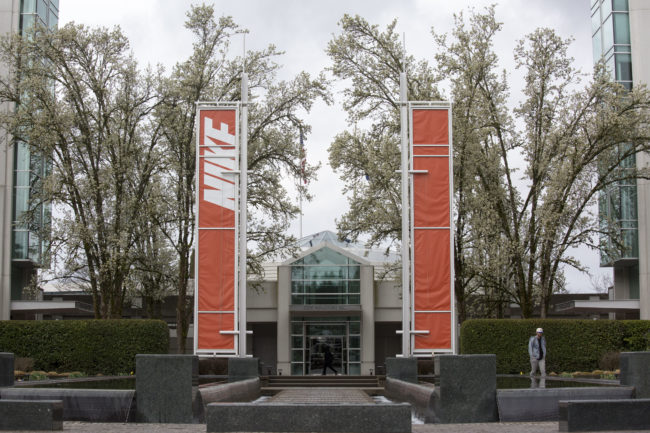Transgender software engineer accuses Nike of workplace discrimination

A giant sculpture reads ‘Do the right thing,’ at the Nike headquarters on March 22, 2018 in Beaverton, Oregon. (Natalie Behring/Getty)
A transgender software engineer hired as a contractor for Nike has filed a workplace discrimination complaint against the company.
Jazz Lyles, who identifies as “transmasculine/non-binary” and uses the pronouns “they” and “them,” has submitted the complaint to the Oregon Bureau of Labor and Industries on September 25, claiming that the company failed to provide a respectful and inclusive workplace, local newspaper Williamette Week reported.
Lyles was hired as a contractor to work in the company’s headquarters in Beaverton, Oregon. Ahead of the start date of May 1, 2017, Lyles communicated their pronoun preference through their recruiter—but, they allege in the complaint, Nike employees and other contractors made no effort to respect their Lyles’, addressing them using female pronouns.
Nike has often supported LGBT+ rights as part of its marketing campaigns, including featuring transgender duathlete Chris Mosier in a 2016 campaign and transgender vogue dancer Leiomy Maldonado as part of the #betrue campaign in 2017.
But Lyles did not feel supported during the employment at the company, claiming their repeated requests to Nike supervisors to enforce their preferred pronouns were ignored.
“They talked a great game on LGBTQ issues,” Lyles said, “but when you ask them to actually stand up for these issues, it gets communicated to you that you are the problem.”

Jazz Lyles is a 36-year-old software engineer originally from Houston, Texas. (Jazz Lyles/Twitter)
Nike has offered no comment on the complaint.
According to the complaint, one colleague stopped talking to Lyles after they sent an article explaining the importance of using a person’s preferred pronouns, while another female co-worker refused to identify Lyles via gender-neutral pronoun due to her “religious beliefs.”
“Nike’s response and solution was not to take corrective action,” Lyles said, “But instead [the response] was to treat me like I was the problem.”
Nike transferred Lyles to a new team in December, but the situation failed to improve—it actually got worse.
Lyles said they received immediate pushback against their request to use gender-neutral pronouns and, in January 2018, one female colleague went so far as saying: “I’m really not sure what to call you. I know I’m not supposed to call you ‘shemale.'”
Nike eventually provided training on gender issues January 25, 2018, but only for a few of Lyles’ co-workers rather than the whole company.
“It again singled me out, made me a problem, and exacerbated the issues with my team,” Lyles said in the complaint. “It would be like holding a training on racial sensitivity with the only team with a black person on it.”

The main entrance of the Nike headquarters is seen on March 22, 2018 in Beaverton, Oregon. (Natalie Behring/Getty)
The toxic work environment took a tall on Lyles’ health, according to the complaint, so they began working from home in August. “I felt invisible and unheard and silenced,” Lyles says. “Language has the ability to erase a person completely.”
By that time, their contract had been extended twice. Lyles was however rejected from being offered a full-time position despite their direct supervisor’s support.
Nike claimed it was entering a “hiring freeze,” but Lyles failed to believe that as other contractors had been hired full-time. The complaint alleges both discrimination and retaliation.

